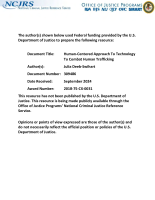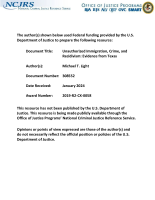Unauthorized aliens
Crime and Victimization on the US-Mexico Border: A Comparison of Legal Residents, Illegal Residents and Native-Born Citizens
Assessing the Relationship between Immigration Status, Crime, Gang Affiliation, and Victimization
Attitudes Toward Police and Judges of Latina Immigrants With a Justice-Involved Child: Do Documentation Status and Family Deportations Matter?
Immigrant Threat or Institutional Context? Examining Police Agency and County Context and the Implementation of the 287(g) Program
The Empirics of Immigration and Homicide: Evidence from California and Texas
Unauthorized Immigration, Crime, and Recidivism: Evidence from Texas
Craniofacial Asymmetry as a Marker of Socioeconomic Status Among Undocumented Mexican Immigrants in the United States
Understanding and Characterizing Labor Trafficking Among U.S. Citizen Victims
Advancing the Understanding of Immigration, Crime, and Crime Reporting at the Local Level with a Synthetic Population
Assessing the Relationship between Immigration Status, Crime, Gang Affiliation, and Victimization
United States, Mexico and Immigration Concerns
Violence Against Latinas: The Effects of Undocumented Status on Rates of Victimization and Help-Seeking
Enter the Dragon: Inside Chinese Human Smuggling Organizations
Illegal Immigration, Immigration Enforcement Policies, and American Citizens Victimization Risk
Civil Protection Order Enforcement
T.K. Logan discusses her study that looked at the impact of civil protective orders for domestic violence victims in five Kentucky jurisdictions. Civil protective orders, sometimes known as restraining orders, may cover various situations, such as ordering an assailant to avoid a victim's home and workplace or forbidding any contact with the victim, including by mail or telephone.
See the YouTube Terms of Service and Google Privacy Policy





